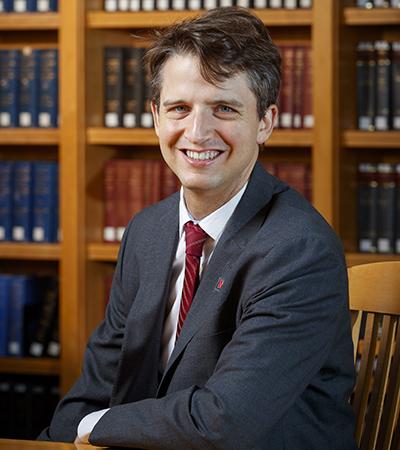
Langvardt’s article published in Yale Journal of Law & Technology
15 Feb 2024
Professor Kyle Langvardt’s article Crypto’s First Amendment Hustle has been published in the Yale Journal of Law & Technology.
Read the abstract below:
Crypto industry attorneys have argued in litigation and before regulatory agencies that the First Amendment immunizes their line of business from ordinary market regulation. On the merits, these arguments range from weak to frivolous. But they nevertheless create value for the crypto industry in two ways. First, they help to drive a predatory marketing strategy that attracts retail investors with appeals to individual liberty and resistance to “financial censorship.” Second, they tee up arguments that financial regulators’ jurisdiction should be interpreted narrowly under the “canon of constitutional avoidance” and the “major questions doctrine.” Overall, crypto’s First Amendment opportunism interferes with public efforts to protect investors, collect taxes, and fight financial crime—and ultimately, it debases the First Amendment itself. At every opportunity, agencies and courts should debunk these arguments in terms that are clear enough for the industry’s target audiences to understand.
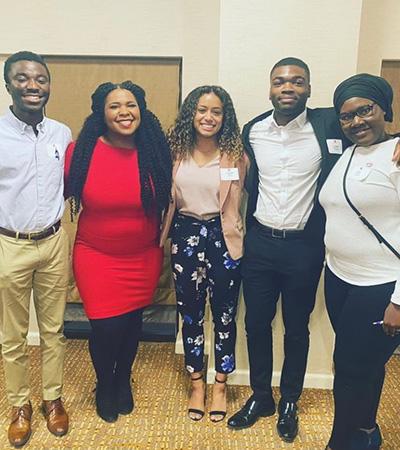
Black Law Student Association creates space for conversation and connection
13 Feb 2024
The College of Law’s Black Law Student Association (BLSA) was reactivated in 2022 with the goal of providing support to Black law students while creating educational opportunities for the entire student body.
Lionel D’Almeida, ’23, is the current BLSA vice president and was one of the students who worked to reactivate the chapter. In their 1L year, D’Almeida and his fellow executive team members saw a need for more open discussions on the impact of race and ethnicity in the context of the cases they were studying. This led them to the idea of creating a space specifically for Black law students to connect.
“It was important to give Black law students an organization that they know will champion them, especially given the low percentage of Black lawyers,” he said.
The American Bar Association reports that Black lawyers made up 5% of the legal profession in 2023, while Black Americans made up 13.6% of the population. This number shows little growth from the 4.8% of Black lawyers in 2013. In this same time span, the number of lawyers in other racial and ethnic groups has continued to grow.
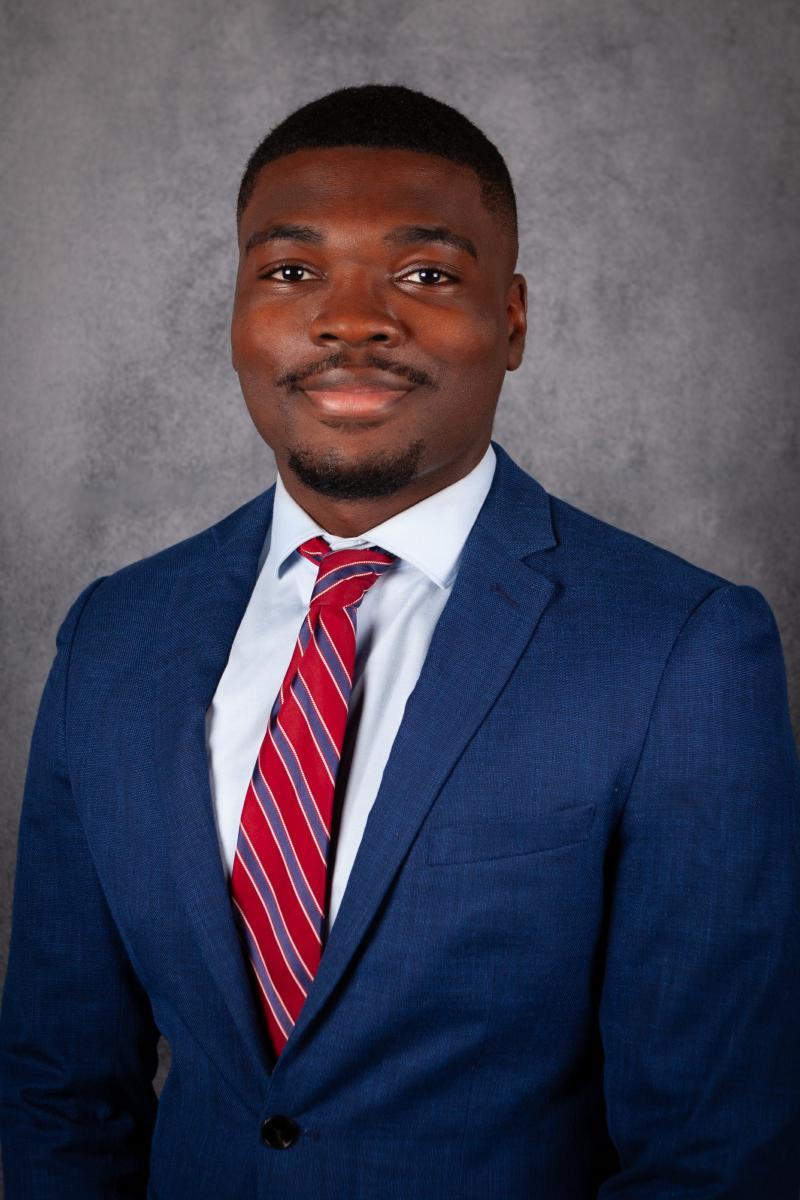
These statistics can have an immense impact in the court of law, D’Almeida said.
“If we look at criminal law, Black people and Black men, specifically, are defendants a lot of the time,” he said. “So having an attorney who looks like you is crucial.”
The effort to make the legal field more representative should start long before law school, D’Almeida said. Reaching high school or middle school students and informing them about the path to law school is one possible route for improvement.
“It’s important to start early in order to make people understand that it’s possible and that they would be supported here,” he said. “We can show them that Black law students are doing this, and you can too.”
BLSA’s efforts have also focused on connecting law students to Black professionals in the legal field and community leaders. Last year, they hosted Restorative Justice Coordinator Shakur Abdullah, who was sentenced to life in prison at 17 years old. Abdullah, who was released on parole, shared his story and his expertise on the issues of juvenile justice and mass incarceration.
Members of BLSA also had the opportunity to meet Damon Barry, ’00, Managing Partner of Ballard Spahr’s Denver and Boulder offices, and City Attorney Yohance Christie.
“Being able to make connections with current lawyers and other law students around the state has been one of the best parts of this,” D’Almeida said.
Post-graduation, D’Almeida is looking to secure a position in corporate law and possibly start his own firm one day. He said he hopes the next BLSA executive board continues to coordinate informative, engaging events and adapt to the needs of Black law students at the College of Law.
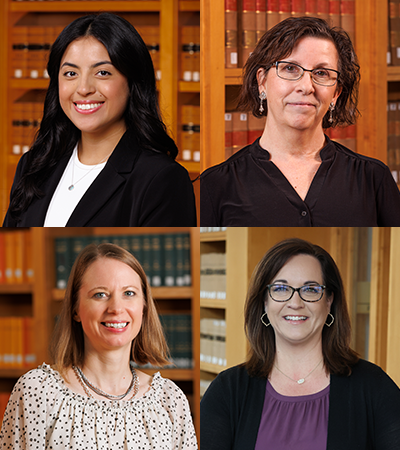
Behind the Scenes with Faculty and Administrative Support
12 Feb 2024
Each month, we’re giving an inside look at the work happening behind the scenes at the College of Law. Members of the Faculty and Administrative Support team help facilitate student success, support Nebraska Law faculty in their work both in and outside of the classroom, and create opportunities for staff development.
Faculty and Administrative Support:
Ariana De Angelo, Administrative Technician
Julie Douglass, Legal Assistant
Sabrina Ehmke Sergeant, Legal Assistant
Ann Reese, Leadership Team Administrator & Project Manager
Q: What does your role at the College of Law entail? What is the most fulfilling part?
AD: In my role at the College of Law, I welcome guests and community members to the college, collaborate with my colleagues on a variety of projects and events, assist students with event planning, and help community members find legal resources. The most fulfilling part of my role is making connections with the Nebraska Law community and being a part of making law school a positive experience for our students.
JD: I coordinate travel in my role, which includes creating travel requests, making reservations, and processing expense reports for faculty and students who are attending events. I also process non-travel expense reimbursements. I coordinate the travel, scheduling, and processing expenses for faculty candidates when they visit the college. I am also the Law Review assistant and the coordinator for Continuing Legal Education (CLE), and I work with Katie Pfannenstiel to submit events for CLE approval, man the sign-in table for CLE events, and process payments for CLE credit. I assist with Canvas navigation and coordinate exam reviews each semester. Additionally, I do multiple print jobs for faculty and help them with proofreading and editing. I process registration for conferences, payment of Bar Dues, subscriptions, etc., and assist staff and faculty with miscellaneous projects throughout the year. I am also the backup for the front desk which includes helping with room reservations, answering phone calls, making coffee, etc.
SES: I am the program coordinator for the Legal Analysis, Writing, and Research (LAWR) Program and the Managing Editor for the Rural Reconciliation Project’s online journal, The Rural Review. LAWR is a required class for first-year law students. In addition to the program director, there are 10 lecturers/adjuncts, 4 research faculty members, and 13 teaching assistants. In my role as Program Coordinator, I facilitate the running of the course by helping students, faculty, adjuncts, TAs, and other members of the College of Law community get what they need, when they need it.
AR: In my role as leadership team administrator and project manager, I assist and support Dean Moberly with scheduling, calendar management, meeting management and preparation, travel, prioritizing requests, etc. I also support other leadership team initiatives, including assisting student organizations and helping to plan staff development activities. I work to manage and facilitate multiple projects, a few of which include submissions to the ABA, U.S. News, and the Princeton Review; course evaluations, and promotion and tenure files.
Q: What is unique about working at the College of Law? What is your favorite memory so far?
AD: Working at the law college is unique because of the community we have. I always enjoy conversing with our students, faculty, and staff. My favorite memory while working at the College of Law is my first Spring Community Service Project in 2023; I had a chance to connect with students and my peers while bagging groceries at the Lincoln Food Bank.
SES: I love being part of the complex Legal Analysis, Writing, and Research Program and helping implement curricular innovations that strive to provide the best pedagogical experiences for students at a critical point in their law school careers.
AR: My colleagues are second to none. It’s the best team I’ve ever been a part of. I love how everyone pitches in to help when anyone needs it, no matter if it is in their area or not.
Q: How do you provide support to faculty, administrators, or staff?
JD: I provide support to faculty by doing travel requests, reservations, and expense reports, processing non-travel expense reimbursements, registering for conferences, and paying bar dues and subscriptions. I also assist with Canvas navigation, coordinating exam reviews, creating photo rosters and seating charts, printing, copying, proofreading, formatting/editing documents and publications, ordering books, and filling out the room reservation form for them when needed.
SES: As Managing Editor of the Rural Review, I manage the publication of material in the online journal. I edit and compose posts on rural scholarship, news, and literature, and participate in workshops and events. My involvement with the project has been an incredible opportunity to learn across disciplines, read widely, and be a part of important scholarly work that engages with a region often oversimplified or overlooked entirely.
AR: I do a lot of work in preparation for administrative team and faculty meetings, including scheduling the meetings themselves, organizing agendas, ensuring that everyone has access to the appropriate documents and materials, and for faculty meetings, tracking the governance items such as meeting minutes and vote counts. In planning staff development events, I meet with Molly Brummond to determine what opportunities we want to provide and ask staff for their input. Then, we make it all happen by contacting presenters, reserving locations, sending calendar invites, working with Ariana on RSVP forms, room reservations, ordering food, setting up and cleaning up the events, and connecting remote staff via Zoom. Facilitating these events for a large staff and faculty means coordinating a lot of moving parts.
Q: This team has an immense impact on the experience at Nebraska Law. Describe the value of providing exceptional assistance and service to our staff, faculty, and students.
AD: The value of providing exceptional assistance and service allows us to achieve shared goals, make connections, and provide a positive experience for those in our community.
JD: The value of providing exceptional assistance is that it allows faculty and staff to serve the students in their respective roles without concerning themselves with the services I provide.
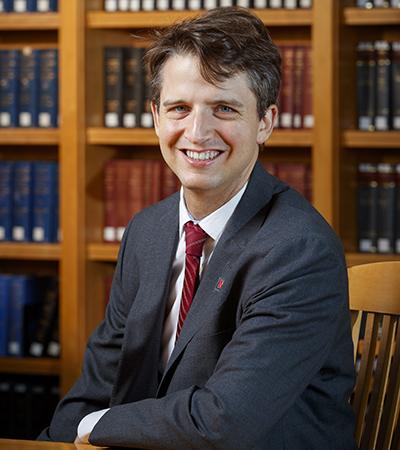
Langvardt’s essay published on Yale Journal of Regulation blog
12 Feb 2024
Professor Kyle Langvardt, with Minnesota Law professor Alan Rozenshtein, has published “The platforms should win the NetChoice content moderation cases – but narrowly” on the Yale Journal of Regulation’s Notice and Comment Blog.
The essay offers a narrow argument for overturning two state laws that require social media companies to refrain from removing certain content. Others have argued that a) social media content moderation is immune from regulation under the First Amendment or b) that requiring social media to carry certain content is constitutional because common-carrier regulation of very large media platforms is presumably constitutional. Langvardt and Rozenshtein reject both of these views. In principle, the authors see a role for government in regulating social media access. But these laws are so poorly drafted that they seem more likely to inhibit than promote user speech on social media. That is why they are unconstitutional.
Read the article here: https://www.yalejreg.com/nc/the-platforms-should-win-the-netchoice-content-moderation-cases-but-narrowly-by-kyle-langvardt-alan-z-rozenshtein/
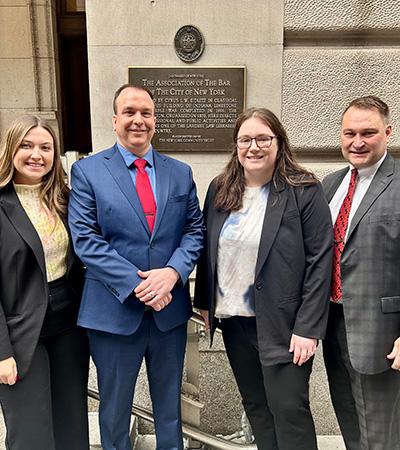
Coogan, Dabney, and Jumps place in top eight at 74th Annual National Moot Court Competition
06 Feb 2024
A Nebraska College of Law team of third-year students Kaci Jumps, Dan Coogan, and Amanda Dabney (l-r) competed at the 74th Annual National Moot Court Competition in New York City on January 29 and 30. The participants were coached by Shannon Doering, ’99 (right).
Hosted at the New York Bar Association, the competition included in two preliminary rounds. The team won against St. Mary’s Law School from Texas in the initial round but faced a setback against a team from Ohio State. Despite the loss, they accumulated sufficient points to progress and secure a spot in the Sweet Sixteen as the 14th seed for the following day.
The team won against the #3 seed on the second day of competition, the University of Pittsburgh from Pennsylvania, and advanced to the final eight. In the subsequent round, they engaged in a close competition against Memphis University from Tennessee, ultimately experiencing a narrow defeat with a split decision from the panel.
The team earned the chance to compete at the National Competition after winning the regional tournament late last year. This year’s moot court question asked the participants to argue a personal jurisdiction question and two issues stemming from the Securities Act concerning cryptocurrency. Jumps joined the National Moot Court team after winning the 2022 Grether Moot Court Competition, while Coogan and Dabney joined after winning the 77th Allen Moot Court Competition.
The team said they would like to thank all of the Nebraska students, alumni, and professionals who assisted in the preparation and practice for this tournament.
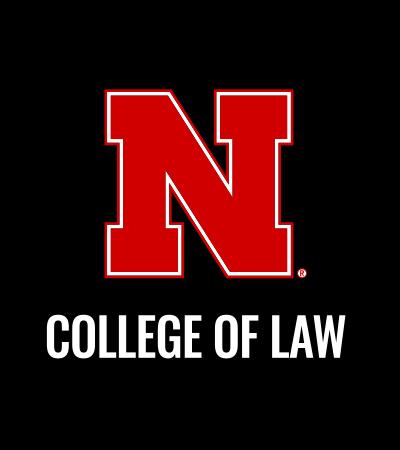
Nebraska Law professors present at Association of American Law Schools Annual Meeting
01 Feb 2024
Five Nebraska Law professors presented at the Association of American Law Schools annual meeting in Washington, D.C.
- Professor Danielle Jefferis presented her work-in-progress “‘The Worst of the Worst’: Civil Rights Cases, Supermax Rhetoric, and Judicial Decision-Making” at the AALS Section on Law and Social Sciences panel. This is a Layman Award-funded project which identifies and examines the phenomenon of “supermax rhetoric” in civil rights cases arising out of the federal supermax prison in Florence, Colorado.
- Professor Colleen Medill served as the Chair in 2023 for the AALS Section on Employee Benefits and Executive Compensation. As Section Chair, Medill organized a competition for scholarly works to be presented on the topic of “Emerging Issues in Retirement Equity,” which was co-sponsored by the Sections on Poverty Law, Aging and the Law, and Minority Groups. Medill served as the moderator for the discussion in which panelists identified ways the current system leads to retirement inequity and what reforms are needed so that all workers can achieve retirement income security.
- Dean Richard Moberly participated in a panel discussion on Labor Relations and Employment Law, co-sponsored by Employment Discrimination Law Section. Moberly shared a “Brief History of the Last Twenty Years of Whistleblower Protection,” in which he spoke about the various legal models that have been used to encourage effective whistleblowing, and analyzed their successes and failures. In addition to his presentation, Moberly also served at the chair of the program committee for the 2024 annual meeting.
- Professor Jessica Shoemaker participated in a panel discussion on Property Law and Real Estate Transactions, co-sponsored by Community Economic Development, Clinical Legal Education and State and Local Government Sections. Shoemaker presented two forthcoming projects (Re-Placing Property and Papering Over Place: When Land Becomes an Asset Class), connecting wider land-based struggles and her developing theories of property and placemaking.
- Professor Elana Zeide participated in a panel discussion on Privacy Risks for Vulnerable Populations, sponsored by the Section on Defamation and Privacy. Panelists shared their research and discussed the vulnerability of communications on digital platforms and their privacy implication for vulnerable populations.
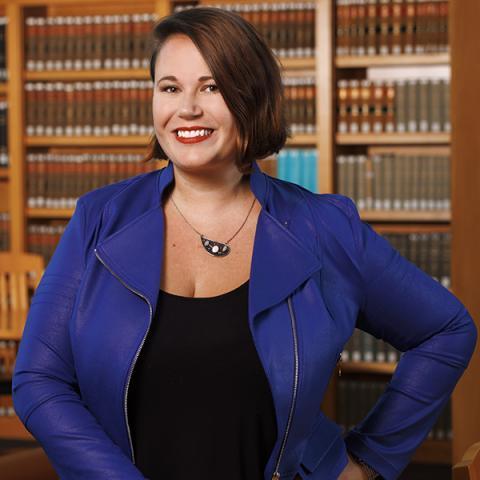
Magilton Presents at TEDxOmaha
01 Feb 2024
Executive Director of the Space and Cyber Law Program, Elsbeth Magilton, gave a talk on "The real-world influence of Star Trek" at TEDxOmaha on November 18th.
"Elsbeth Magilton takes us through the strange twists and turns of how using Star Trek to entice student to attend her Space Law lectures, took a sudden leap into hyperdrive. From being fun and silly, Star Trek morphed from Pop Culture, into a high impact learning tool using stories to explore a different space, and challenge different frontiers. Using not just any stories, but science fiction stories became a vehicle to discuss, and unpack some really hard topics that face us today. Sci-Fi isn’t fantasy, it’s futurism. It is removed enough from our experiences and bias to let us look at challenges objectively. When we move into that space, we can explore with less constraints, and may even surprise ourselves with our different perspectives."
Watch the entire presentation at https://www.youtube.com/watch?v=_LR2gVhUqhU .
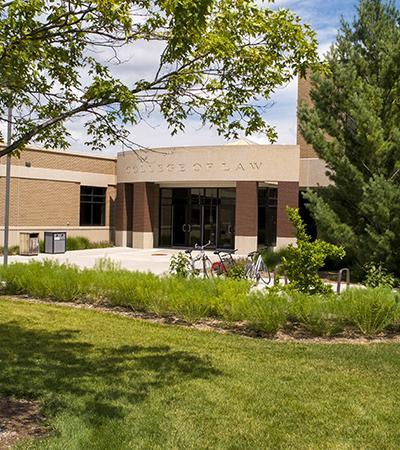
Department of Justice grant will support creation of Innocence Clinic
30 Jan 2024
The University of Nebraska College of Law will begin operating an Innocence Clinic this fall.
In Nebraska, more than 5,500 people are incarcerated in 10 state prisons and another 1,000 are in the custody of private prisons and local jails. Per data from the Prison Policy Initiative and U.S. Department of Justice, the state’s incarceration rate is among the highest in the nation. Two studies published within the past decade estimate that 4% to 6% of people incarcerated in U.S. prisons are actually innocent. In Nebraska, that translates to as many as 300 individuals currently serving sentences for crimes they did not commit. The new clinic aims to help those people.
While there is a presumption of innocence when someone goes to trial, once a person is convicted of a crime, the presumption of guilt is extraordinarily difficult to overcome. The National Registry of Exonerations reports that 3,458 defendants have been exonerated since 1989 and collectively served more than 31,070 years in prison for crimes they did not commit.
With the help of a $600,000 grant from the U.S. Department of Justice, third-year students in the College of Law will raise awareness of wrongful convictions in Nebraska and work to exonerate those who have been wrongfully convicted. As part of the review of cases, students will help establish the primary causes of wrongful conviction and identify the most effective methodologies to prevent future wrongful convictions in the state.
“Our clinical programs help students develop skills that they will rely on in practice,” said Richard Moberly, dean of the College of Law. “The Innocence Clinic will contribute to training the next generation of Nebraska lawyers as they learn about the causes of wrongful conviction and experience case identification and litigation of actual innocence claims.”
Kala Mueller, director of public interest programs, added: “This type of training has been shown to help reduce the risk of future wrongful convictions both in Nebraska and elsewhere.”
There have been just 10 exonerations in Nebraska history, six of which stemmed from a single case.
The Innocence Clinic will be Nebraska’s 10th clinical program. The others are the Children’s Justice Clinic, Civil Clinic, Criminal Clinic, Debtor’s Defense Clinic, Estate Planning Clinic, First Amendment Clinic, Housing Justice Clinic, Immigration Clinic and Weibling Entrepreneurship Clinic.
The College of Law is partnering with the Midwest Innocence Project to identify potential cases for the clinic. Under the supervision of the clinic director, students will review and investigate cases for potential claims of innocence for individuals whose cases originated in Nebraska and who have applied for assistance from the Midwest Innocence Project. The grant funding provided by the Department of Justice will assist in moving more than 41 cases from the existing waitlist forward.
Mueller, who is a member of the Midwest Innocence Project board of directors, said the partnership is important to the success of Nebraska’s Innocence Clinic.
“The Innocence Clinic will have a small staff, making the potential volume of requests nearly insurmountable,” Mueller said. “We’re grateful to the Midwest Innocence Project for allowing us to benefit from their already established screening process.”
Potential clients will need to contact the Midwest Innocence Project to submit a case: https://themip.org/submit-a-case/.
Individuals interested in supporting the Innocence Clinic may call (402) 472-2161 or email law@unl.edu.
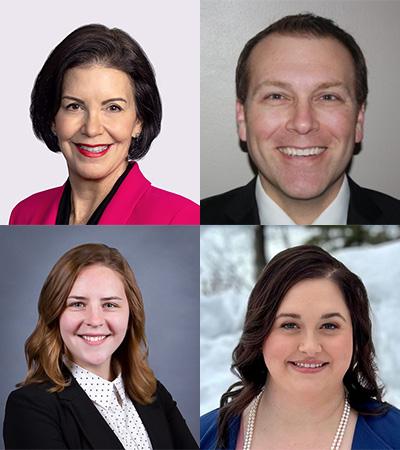
Alumni News | January 2024
30 Jan 2024
Every month, we bring you the latest updates from our alumni near and far.
ALUM NOTES
Amy L. Peck, ’87, received the 2024 Lexology Client Choice Award for her work in providing excellent client care and quality client services.
Beau G. Finley, ’96, was named county court judge for the Fourth Judicial District of Nebraska, including Douglas County.
Lyndsay A. Hurilla, ’19, has joined the firm of Barnes and Thornburg in their Salt Lake City office.
ALUM IN THE NEWS
Kimberly A. Lawton, ’10, received the 2023 District Attorney of the Year Award from the Wisconsin District Attorneys' Association. Lawton has held the position of Bayfield County District Attorney since 2016 and has filed over 1,000 criminal cases since taking office.
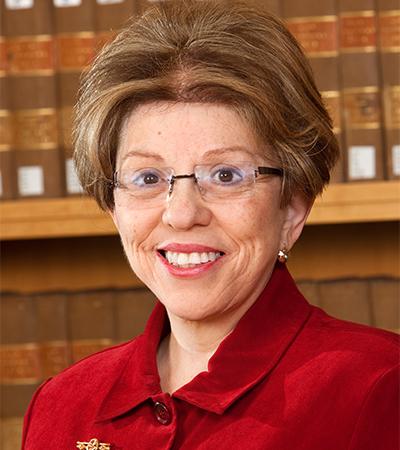
Potuto’s article published in Oklahoma Law Review
30 Jan 2024
Professor Potuto’s article A Fine Mess: The NCAA, the Collegiate Model, and the Post-Alston World has been published in the Oklahoma Law Review.
The article addresses some on-the-ground implementation and practical consequences of NIL deals. They include collectives, the impact on recruiting and competitive equity, NCAA enforcement issues, questions regarding the applicability of Title IX, the impact on high school and even younger athletes, conflicts with athletic department exclusive sponsorship deals, the likelihood of a federal legislative solution, and the slippery slope to pay for play.
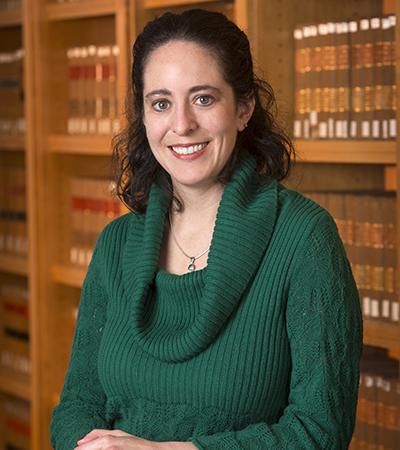
Blankley, Votruba publish article on race in rural and non-diverse communities
26 Jan 2024
Professor Kristen Blankley and Assistant Professor of Psychology Ashley Votruba have published Discussing Race in Rural and Non-Diverse Communities in the Ohio State Journal of Dispute Resolution.
The article is an extension of their participation in the “Rethinking System Design for Racial Justice” hosted by Ohio State’s Divided Community Project, Harvard University’s Negotiation and Mediation Clinical Program, and Stanford Law School’s Gould Center for Dispute Resolution.
It takes an interdisciplinary approach to the issue of discussing race in primarily white and otherwise non-diverse populations. It draws on research from the substantive disciplines of psychology and antiracism and combine them with the literature and practice of facilitation, dispute system design (DSD), and mediation. The article focuses on discussing race in large groups; it does not cover the equally difficult issues of discussing race in mediated cases, such as discrimination cases, or in restorative justice conversations.
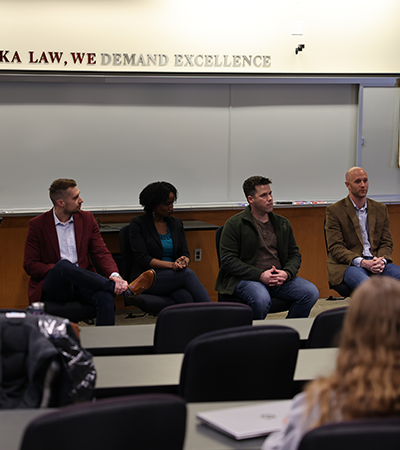
LL.M. Students Present Panel on Careers in the JAG Corps.
24 Jan 2024
Both the Space, Cyber, and National Security Law Club and Armed Forces Legal Society hosted a panel on careers in the Judge Advocate General (JAG) Corps. Current in-person LL.M. students who are active duty U.S. Air Force and Army JAGS were panelists, providing background on their experiences, what it looks like to work as a space or cyber lawyer for the armed forces, and answering questions for JD students. President of the Armed Forces Legal Society and Career Coordinator for the Space, Cyber and National Security Law Club, Zach Hellen, '25, served as the moderator for the panel.
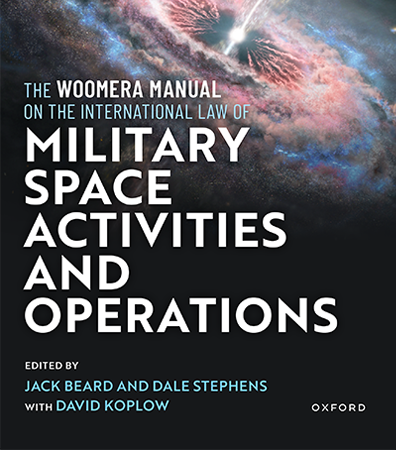
Woomera Manual Available for Preorder
22 Jan 2024
Preorder is now available for "The Woomera Manual on the International Law of Military Space Operations," a project that our Director, Jack Beard, has been working meticulously on over the past few years. The Woomera Manual analyzes 3 phases of military space interactions: peace, tension or crisis, and armed conflict. It also delves into different legal regimes, history of the law in this area, and state practice. Drafts of the manual were reviewed and commented on by numerous countries at The Hague in 2022.
The manual is available for pre-order at https://global.oup.com/academic/product/the-woomera-manual-on-the-international-law-of-military-space-operations-9780192870667?cc=us&lang=en&.
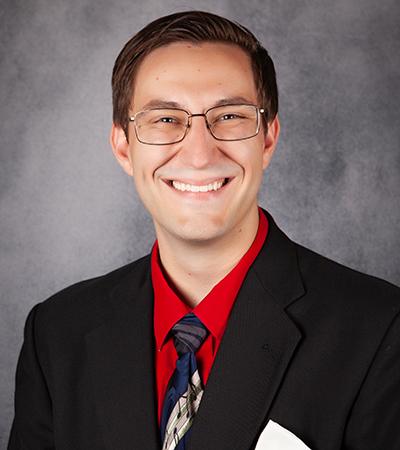
Kleinjan provides case summaries for Nebraska State Bar Association
19 Jan 2024
Alex Kleinjan, ’24, published Nebraska Supreme Court case summaries for the Nebraska State Bar Association’s The Nebraska Lawyer magazine. This new section summarizes major cases from the Nebraska Supreme Court. Students from Nebraska Law and Creighton Law prepare and submit the summaries for publication.
Kleinjan completed this project as part of his Schmid Research Fellowship. He worked with the NSBA, fellowship director Professor Stefanie Pearlman, and Wendy Wussow, former Clerk of the Nebraska Supreme Court, to identify potential cases. Through his research, Kleinjan identified the following cases for summarization: Sinu v. Concordia University, State v. Sullivan, Timothy L. Ashford, PC LLO v. Roses, In re Adoption of Faith F., Muller v. Weeder, Chatterjee v. Chatterjee, State v. Lewis, Pinnacle Bancorp, Inc. v. Moritz, State v. Johnson, Charter West Bank v. Riddle, and Adams Land & Cattle, LLC v. Widdowson.
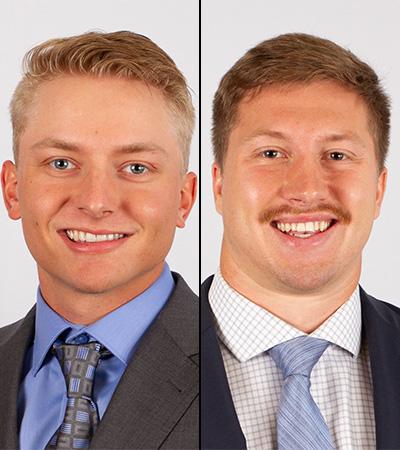
Berg, Tetzlaff place first in Frank & Lawson Client Counseling Competition
17 Jan 2024
Christopher Berg, ’24, and Preston Tetzlaff, ’24, took first place in the 2024 Frank & Lawson Client Counseling Competition this past weekend. Thirteen teams, each comprised of two Nebraska Law upper-class students, completed intake interviews with client actors facing legal issues related to education.
Connor Oldenburg, ’25, and Jadon Smith, ’25, took second place, while Kyle Kelley, ’25, and Shaianne Sunagawa, ’25, took third. The top two teams will represent Nebraska Law at the ABA Regional Competition hosted by Creighton Law in February.
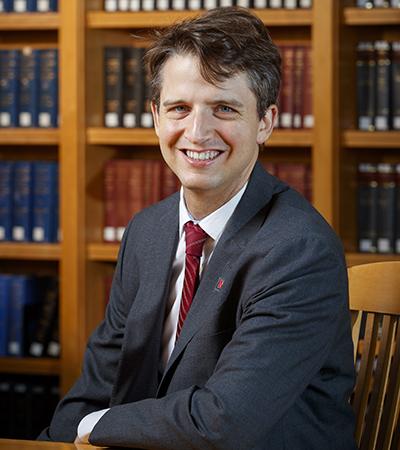
Langvardt co-authors opinion piece for Association of Computing Machinery
10 Jan 2024
Professor Kyle Langvardt and Minnesota law professor Alan Rozenshtein co-authored Beyond the Editorial Analogy: The Future of the First Amendment on the Internet, for Communications of the ACM, the monthly journal for the Association of Computing Machinery.
In the article, Langvardt and Rozenshtein argue that the Supreme Court should strike down two laws – out of Florida and Texas – that claim to protect the free speech of users on social media platforms. While some regulation to protect user speech interests could be valuable in principle, the authors argue that these particular laws are so poorly designed that they will undermine rather than enhance the speech interests of users.
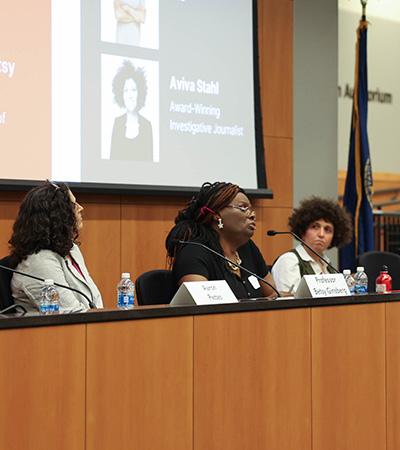
Law Review Symposium sheds light on federal prison system
20 Dec 2023
This fall, the Nᴇʙʀᴀsᴋᴀ Lᴀᴡ Rᴇᴠɪᴇᴡ hosted a symposium titled “Advancing Justice for the Federally Incarcerated.” The gathering marks the first in-person symposium organized by the Law Review in 15 years.
The event served as a platform for timely and informed discussion, collaboration and exchanges of ideas between law professors, attorneys, judges, affected persons and journalists to shed light on critical aspects of the federal prison system and the way in which the system impacts the people in its custody.
“Our overall goal of the symposium was to discuss and highlight a pertinent issue in the legal community and bring together a diverse group of perspectives to discuss that issue in an accessible way,” said Murphy Cavanaugh, ’23, Nᴇʙʀᴀsᴋᴀ Lᴀᴡ Rᴇᴠɪᴇᴡ symposium editor.
Legal expert Dee Farmer delivered a keynote address on her litigation in Farmer v. Brennan, in which she was the first transgender plaintiff to bring a case before the United States Supreme Court.
Farmer is now a legal consultant for the National Center for Lesbian Rights and Gay and Lesbian Advocates and Defenders and a Paralegal Fellow in the MORCA-Georgetown Paralegal Program. She continues to speak out against prison conditions and help terminally ill inmates work towards compassionate release.
“We, as advocates, should push forward to ensure that the law protects what is right and decent,” she said. “I believe that we all have a purpose or some role to play in advancing humanity.”
This symposium in particular intrigued Farmer, as she said it’s rare that the federal prison system is analyzed in such a context.
“The federal system is widely believed and accepted to be the model for all correctional systems within the United States,” she said. “It’s very seldom, if ever, that it’s reviewed in this kind of setting.”
The symposium also featured three discussion panels, each offering an exploration of issues surrounding federal incarceration, from the pre-incarceration phase to conditions within prisons to strategies for holding state actors and systems accountable. This format was chosen by the symposium organizers with the help of professor Danielle Jefferis and associate dean for diversity, equity, and inclusion Stefanie Pearlman.
“We carefully crafted a ‘beginning, middle and end’ structure for our panels to discuss the federal incarceration experience so we could touch upon all pertinent aspects of the conversation including the roles of judges and attorneys at the federal level, what makes the federal system different from the state system, conditions of confinement and prison accountability,” said Cavanaugh.
The first panel analyzed the phase before incarceration and featured U.S. District Judge Joseph Bataillon, assistant federal public defender Jessica Milburn, ’00, assistant U.S. Attorney Lecia Wright, University of Chicago professor Pedro Gerson and RISE in-prison program associate Aaron Pettes.
“Our first panel was a particularly good example of how useful differences of perspective can be,” said Matias Cava, ’23, Nᴇʙʀᴀsᴋᴀ Lᴀᴡ Rᴇᴠɪᴇᴡ editor-in-chief. “It demonstrated that parties generally characterized as adversarial genuinely have common ground in diagnosing the problems faced by incarcerated individuals, and even sometimes agree on the way the system needs to change.”
One challenge, illustrated by professor Gerson, relates to immigration detention conditions, as inmates can be transferred from detention facilities near their community to facilities in remote areas. This transfer makes it difficult for them to gain access to an attorney.
“Placing immigrants into these remote facilities really makes their lives and their processes a lot harder,” he said.
During the second panel, participants analyzed conditions of confinement and the experiences of prisoners within the federal incarceration system.
Topics of discussion included the examination of prison infrastructure, the provision of healthcare, mental health support, educational opportunities and the impact of overcrowding. In discussing measures to support the mental health of incarcerated individuals, University of Denver Sturm College of Law professor Laura Rovner said not only does the prison system often fail to provide sufficient mental health care, but it can also create the mental health conditions for which prisoners need care. This risk is especially high for those in solitary confinement.
“There is all of this forced idleness, and then we wonder why people start to develop anxiety and depression,” she said.
In closing out the symposium, the final panel covered prison accountability and performance measures, highlighting the various efforts being undertaken by the legal field, organizations and other stakeholders to ensure accountability within the federal prison system. Panelists discussed strategies to address systemic issues, promote rehabilitation and protect the rights and dignity of incarcerated individuals.
Cardozo School of Law professor Betsy Ginsberg noted possible remedies in cases involving the prison system, such as payment, injunctions, and release. She also pointed out that even when a case is lost, good can come from it.
“Losses can do a lot of things,” she said. “Information comes out of cases, discovery brings forth lots of information that can be made public sometimes."
The Nᴇʙʀᴀsᴋᴀ Lᴀᴡ Rᴇᴠɪᴇᴡ team said the response from the community was overwhelmingly positive and saw significant engagement from attendees and students alike.
“This Law Review symposium was an opportunity for honest conversation, not just among academics, but for lawyers and non-lawyers affected by federal incarceration,” Cava said.
Visit lawreview.unl.edu/advancing-justice-for-the-federally-incarcerated for additional event information.
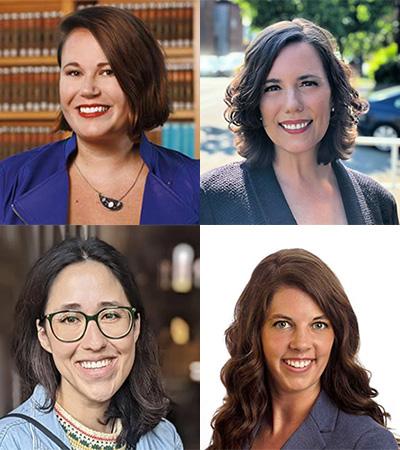
Alumni News | December 2023
20 Dec 2023
Every month, we bring you the latest updates from our alumni near and far.
ALUM NOTES
Elsbeth J. Magilton, ’11, was a featured speaker at TEDxOmaha, where she presented “Silly and Serious: A Journey in Star Trek, Law, and Hard Topics.”
Mackenzie J. Sorich, ’16, who operates the solo firm of View Ridge Family Law & Estate Planning, was honored on the exclusive Law Firm 500 List of the nation's fastest-growing practices.
Sarah C. O’Neill, ’22, has joined Legal Aid of Nebraska as an attorney within the Housing Justice Project.
ALUM IN THE NEWS
Rene M. Blauhorn, ’16, has opened Blauhorn Law in Grand Island. The firm specializes exclusively in personal injury law and will serve the Tri-City area.
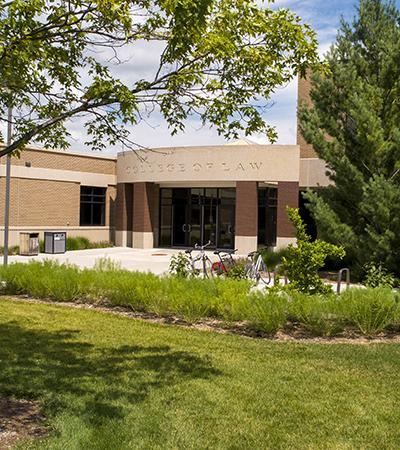
Nebraska Law named a “Best Law School for Your Money”
18 Dec 2023
The University of Nebraska College of Law has been named a Best Law School for Your Money by Money Magazine. This is the inaugural list presented by Money.
For more than a decade, Nebraska Law has been included on lists ranking best value and lowest debt.
“Students considering law school should consider cost and the debt that will be required to pay for school, along with bar passage rates and whether graduates get real legal jobs,” said Dean Richard Moberly. “Money’s list is recognition of Nebraska Law’s success in all of these areas.”
Nebraska Law received four-and-a-half stars out of five, putting the college among the top 20 in the nation. Key data points reported as part of the list include:
- Estimated annual cost of $32,820
- Average student debt of $62,060
- Employment rate of 96%
- Average early career salary of $57,020
Nebraska residents currently pay annual tuition and fees of $16,081.
The methodology weighed numerous data points, prioritizing annual tuition and fees, average student debt and typical earnings for recent graduates.
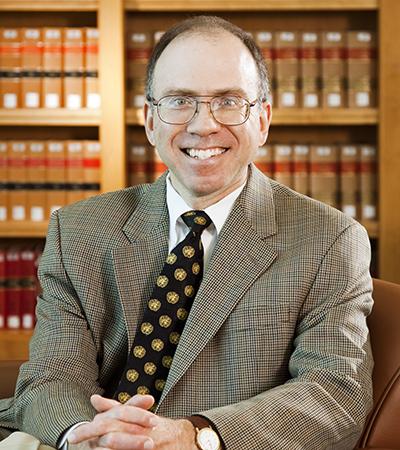
Professor Lepard publishes book review in the Nordic Journal of Human Rights
13 Dec 2023
Professor Brian Lepard has published a book review in the latest edition of the Nordic Journal of Human Rights.
The review analyzes William A. Schabas’ book on The Customary International Law of Human Rights, which was published in 2021 by Oxford University Press. Professor Schabas is Professor of International Law at Middlesex University in London. The book contains an extensive analysis of the role of customary international law in the protection of human rights and of the customary law status of a wide variety of rights recognized in the Universal Declaration of Human Rights, adopted 75 years ago, and many other international human rights declarations and treaties.
Professor Lepard himself is a recognized expert on international human rights law and customary international law. His most recent book is Reexamining Customary International Law, published by Cambridge University Press in 2017. The book includes a chapter on “Toward a New Theory of Customary International Human Rights Law.” Professor Lepard is the Harold W. Conroy Distinguished Professor of Law at the College of Law.